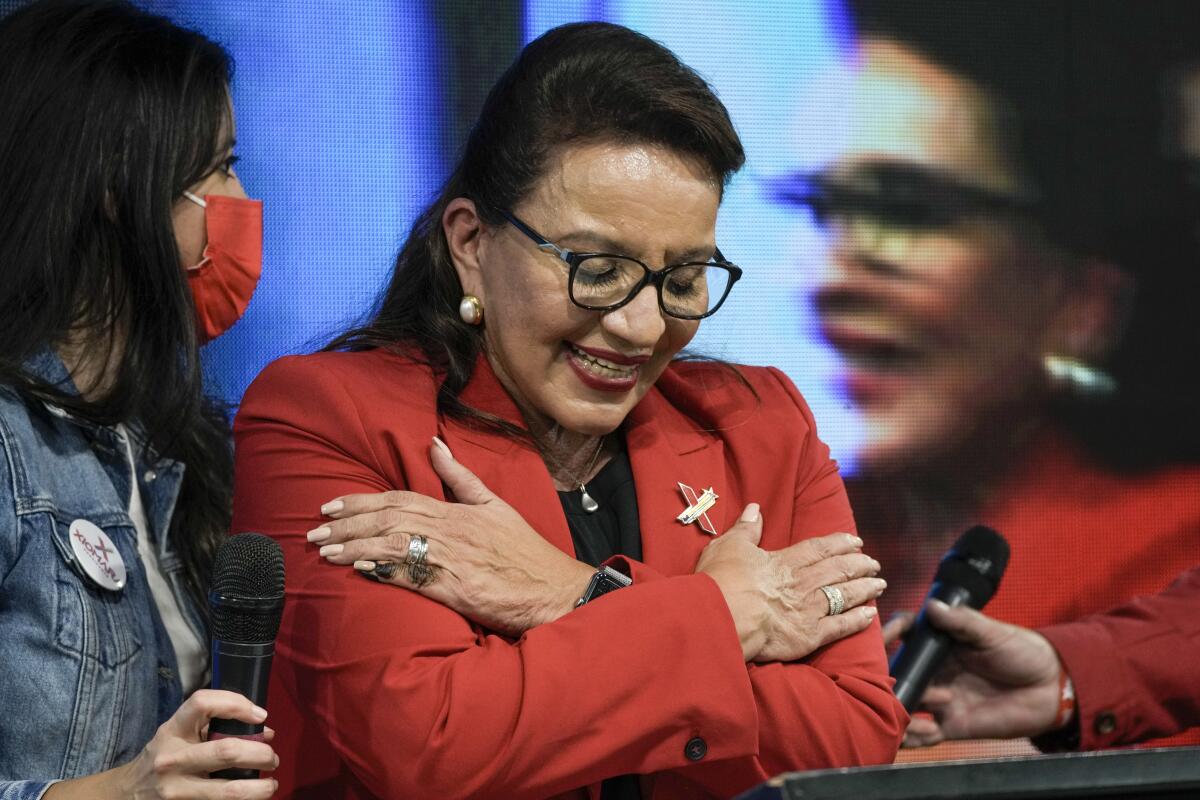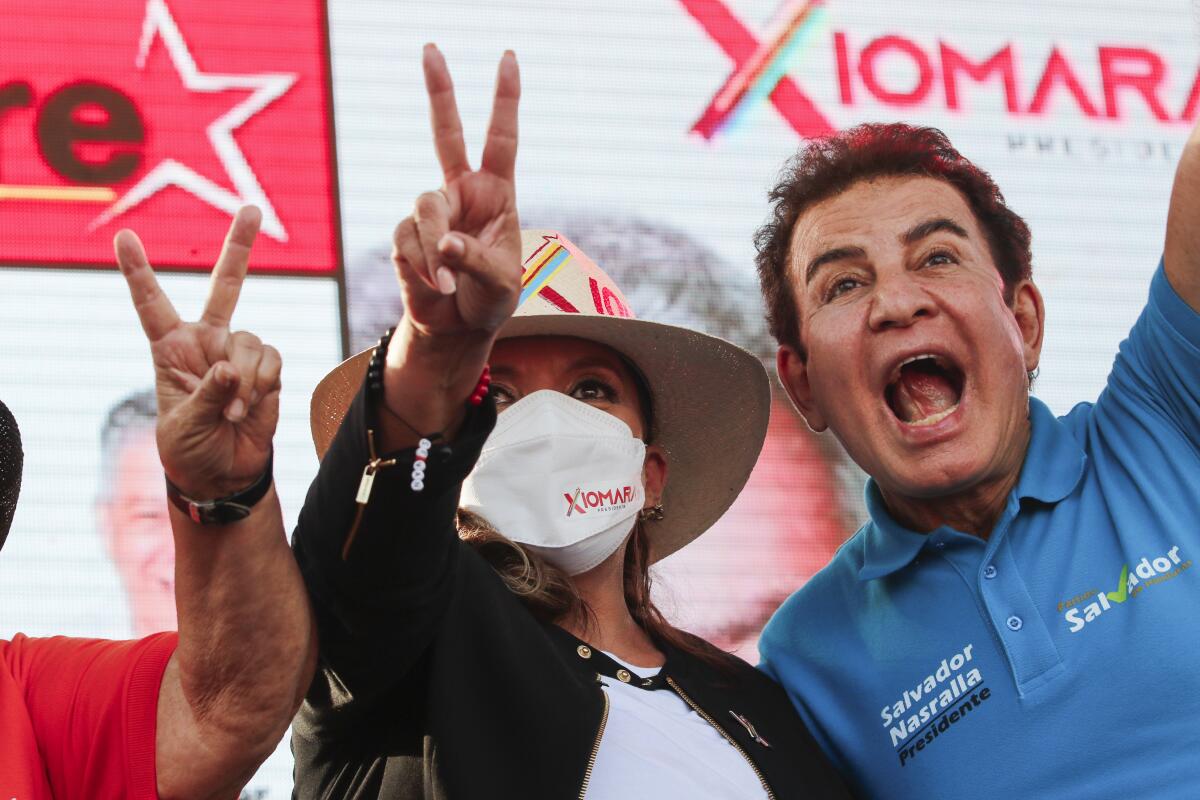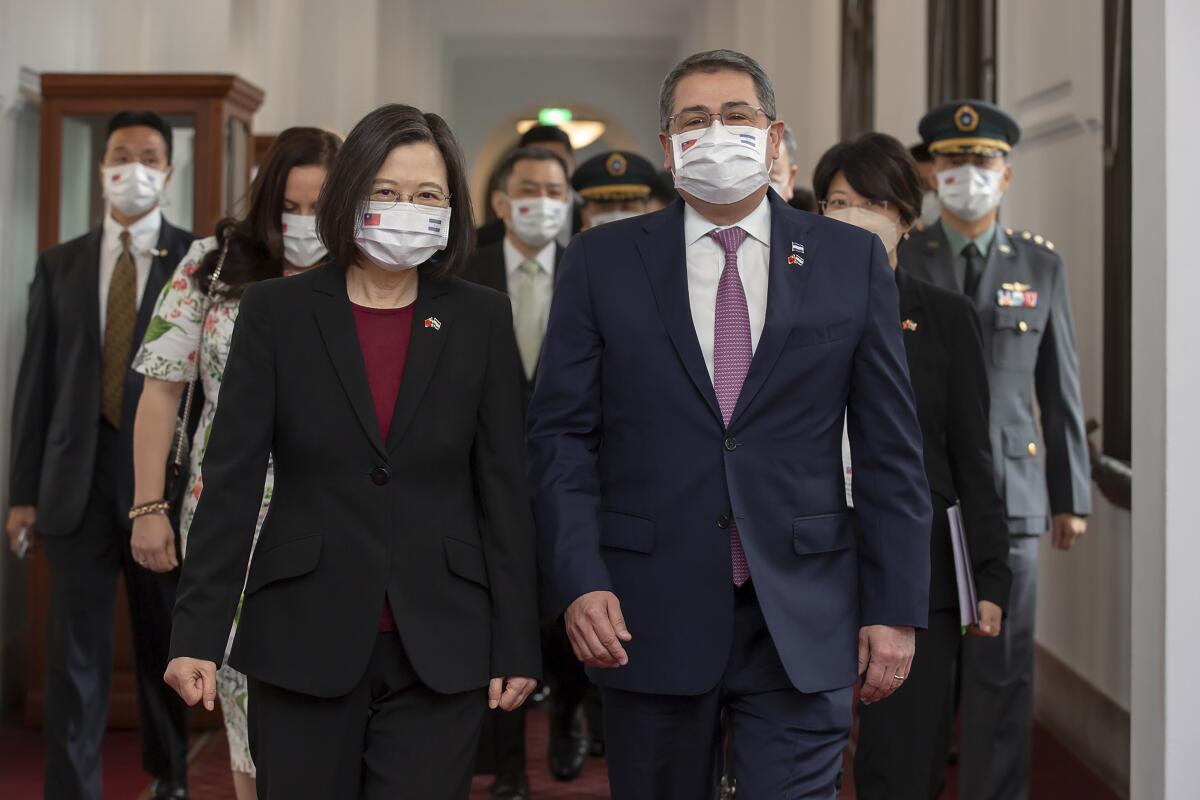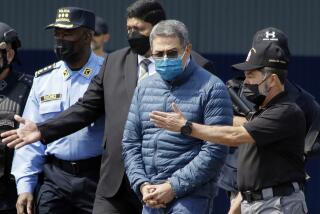The promise of a fresh start in Honduras is tarnished by a political crisis

MEXICO CITY — The inauguration this week of the first female president of Honduras was supposed to be a turning point for a country long beset by political dysfunction — and a fresh start for U.S. efforts to bring stability to the region and curb migration.
Xiomara Castro, who won in a landslide in November, has vowed to make a dramatic break from her predecessor, whose eight years in power were marked by unprecedented numbers of citizens fleeing for the United States and allegations of drug trafficking at the highest levels of government.
But as Vice President Kamala Harris, King Felipe VI of Spain and other dignitaries prepare to fly in for Thursday’s swearing-in ceremony, it has become clear that Honduras will not so easily escape its past.
A new political crisis has pitted Castro against familiar foes and threatens to derail her ambitious agenda, spark instability in the streets and drive more migrants north.
The gravity of the crisis was apparent Tuesday, when two distinct groups of lawmakers each claiming to be the country’s official legislative body held dueling sessions, one in the chambers of Congress, the other over Zoom.
The schism has its roots in the presidential election and a deal that is widely credited with helping Castro win.

Salvador Nasralla, a popular opposition figure, dropped his own presidential bid to support Castro. In return, she promised leadership of Congress to a lawmaker from his Savior Party.
But on Friday, nearly two dozen deputies from Castro’s left-wing Libre party rebelled, electing one of their own as president of Congress by aligning themselves with the right-wing National Party of outgoing President Juan Orlando Hernández.

As they swore in Jorge Cálix, a prominent Libre lawmaker with family ties to the Hernández administration, fistfights broke out in the congressional chamber.
Decrying the rebellion as a “betrayal,” Castro vowed to expel the legislators from Libre and said she would not recognize Cálix.
Later, lawmakers who still supported her met separately and elected Castro’s preferred candidate, Luís Redondo, as congressional president. Experts say both factions appear to have violated procedural rules, and neither will be able to pass legislation without triggering immediate legal challenges.
The political drama disappointed many in Honduras, who saw Castro’s election — which was free of violence and allegations of fraud, unlike other recent votes — as a victory for the country’s democracy.
Modern democracy didn’t arrive in Honduras until the 1980s, after a string of military dictators. But it was dealt a blow in 2009, when its president, Manuel Zelaya, was forcibly removed in a coup by the military and conservative forces.
In the aftermath of the coup, a new political career was born. At the helm of the resistance movement was Zelaya’s wife, Castro.
President Obama criticized the coup, but his administration eventually recognized Porfirio Lobo Sosa, the president who was elected to succeed Zelaya.
During the subsequent years, which were dominated by Hernández’s National Party, migration from the country rose dramatically.
The mass departure of tens of thousands of children from Honduras as well as neighboring El Salvador became an explosive domestic policy issue during Obama’s second term. He responded by pushing for a multibillion-dollar aid package to Central America to address what he called the root causes of migration.
The 2018 emergence of migrant caravans — in which large numbers of migrants banded together to reach the U.S. border — was used by then-President Trump to justify harsher border policies.
Many migrants were fleeing miserable economic conditions in Honduras, where more than 50% of people live in poverty, and spiraling crime, including high rates of extortion and homicide.
Honduran President-elect Xiomara Castro has seen her prospects of a successful administration take a hit even before her Jan. 27 inauguration
But there was no mistaking that political instability was also driving the exodus.
The caravans included many young people who said they had been violently suppressed during street protests that erupted in 2017, when Hernández claimed reelection in a vote that many considered fraudulent. As they trudged north, migrants often sang songs or chanted slogans calling for the removal of Hernández.
At the same time, many U.S. officials were losing faith in the president.
Juan Antonio “Tony” Hernández, a former Honduran congressman and brother of the president, was sentenced by a U.S. federal judge to life in prison plus 30 years for drug trafficking last year.
In making their case against Tony Hernández, prosecutors alleged that his brother also helped traffic drugs, with prosecutors claiming the outgoing president used his nation’s armed forces to protect huge shipments of cocaine in exchange for hefty bribes.
They quoted Juan Orlando Hernández as saying he wanted to make the U.S. Drug Enforcement Administration think that Honduras was fighting drug trafficking, but instead he was going to “shove the drugs right up the noses of the gringos” by flooding the United States with cocaine.
He has not been charged with a crime, but several U.S. lawmakers have called on prosecutors to bring charges against him after he leaves office Thursday.
The prospect of prison time may have played into his party’s efforts to try to wrest control of Congress away from Castro.
In a session of the legislative group led by Cálix on Tuesday, the lawmaker suggested that the justice system in Honduras, not in the U.S., should try officials accused of corruption, leading some to wonder whether he aims to protect Hernández from possible extradition.
As the country’s political crisis mounted this week, with Castro’s supporters massing at the congressional headquarters in Tegucigalpa, the capital, many worried about the possibility of violence.
“It’s all a potentially incendiary mix,” said Tiziano Breda, Central America analyst for the International Crisis Group, a nonprofit watchdog organization.
“The country could experience another wave of social turmoil,” he said. And that, he added, could eventually spark more migration.
Honduran media have reported that the U.S. Embassy has been involved in bringing the sides together to talk.
Speaking about the political crisis Monday, State Department spokesman Ned Price did not say whether the U.S. was mediating an agreement between the two congressional factions.
He said that decisions in the Honduran Congress were the sovereign purview of that country, but called on “political actors to remain calm, engage in dialogue and refrain from violence and provocative rhetoric.”
A White House official said Harris is still scheduled to travel to Honduras on Thursday.
Times staff writers Tracy Wilkinson and Noah Bierman in Washington contributed to this report.
More to Read
Sign up for Essential California
The most important California stories and recommendations in your inbox every morning.
You may occasionally receive promotional content from the Los Angeles Times.













